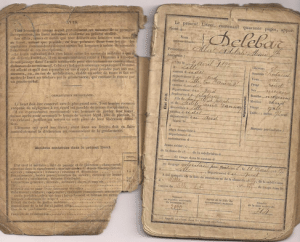In Search of Sailors and Soldiers: Military Records and Genealogical Research
Whether it’s a meticulously prepared Daughters of the American Revolution application or an enlistment record that transports you across the decades with descriptive details, military records are an important source of information in genealogical research. Military records help us understand when and where our ancestors fought and served, what wars they were part of, and whether they dedicated time to national security during times of peace. There are numerous types of military records that researchers encounter: draft accounts, muster rolls, detailed service records, pension documents, bounties, cemetery records and veteran's profiles. Here’s a closer look at how to interpret military records and how they can inform your genealogical search.
Navigating military paperwork
One of the advantages of conducting genealogical research with military records is that most militias across time and countries have been well-organized. Military service can be one of the richest sources of written details about the life and times of a specific ancestor. This is true whether your ancestor served in a distant navy or army, or more recently in branches like the Air Force and National Guard. It’s important to remember that military paperwork typically relates to different points in the service lifecycle:
- Enlistment records: Records for new sailors and soldiers are often excellent, offering details such as the name, date of entry, location that the person joined, and biographical and descriptive details. These records can include draft cards during periods of compulsory service.
- Muster Rolls: Muster rolls provide lists of individuals who served in a particular unit, including details of such as names and ages. Muster rolls go back hundreds of years, and can be an important record of service prior to the Civil War.
- Ongoing service records: These records can relate to location and dates of service, the base your ancestor was stationed at or the ship your ancestor served aboard, or specific details related to honors he or she received.
- Draft and war records: Draft records typically refer to compulsory service for males between the ages of 18 and 35. In some cases, much older individuals also signed up under the draft. Different collections offer searchable draft records for Canada and the US (currently available via Ancestry.com).
- Bounty land records: Some soldiers received bounty land grants in exchange for service during the Revolutionary War and the War of 1812. There were also a number of other land grants filed prior to 1855.
- Prison and hospital records: If something extraordinary happened during your ancestor’s service, there may be prison or hospital records to supplement their files. Prison and trial records can advise you if they were accused or convicted of a crime. Hospital records detail the nature of injuries and treatment.
- Discharge and pension records: These types of records relate to how and when your ancestor left the service. They may also offer important insights into life after the military. Possible post-service records include honorable and dishonorable discharges, pension records, veterans support, and military burial details.
Accessing Military Records
If you’re currently researching an ancestor that you know served in the military, accessing these records can greatly expedite your research. But if you don’t have personal experience with finding and reviewing military records, it can be a challenge to know where to get started. What follows is a list of several different options to launch your search.
The National Archives: The National Archives stores records in two repositories, one in Washington DC and the other in St. Louis, Missouri. Their website outlines the procedures for visiting the archives and obtaining copies of specific records.
Ancestry.com: Ancestry.com has digitized a significant portion of America’s military records prior to WWII. These include WWI draft cards and WWII draft cards. They also have collections of foreign national service records available.
War Pensions: Fold3 has information available on Revolutionary War Pensions, Civil War Pensions, and Civil War Widows Pensions.
Taking pride in your family’s military service and uncovering the details is one of the pleasures of genealogy. There’s a vast world of military records that can help fill in important gaps in your family narrative. If you need assistance locating and interpreting military records in your genealogical search, contact us today for a personalized consultation to find out how working with a professional genealogist can help.

